Goal setting is a major component of living an intentional life – if you aren’t setting goals for yourself, it’s hard to be intentional in your day to day actions. Often, when we don’t have goals we are actively working towards, it can be easy to get swept away in a life on autopilot.
If your version of goal setting is writing down a couple of New Year’s resolutions every year and slowly letting them fade into the background as the year goes on, you’re probably with the majority of the rest of the world. You may even be ahead of the game if you actually follow through on any of those resolutions.
But goal setting is about so much more than a resolution to be better. The more intentional we are about this process, the more likely we are to lead meaningful lives.
Goal setting also does not have to be intimidating – it should be exciting! Think of it like you would think about planning a vacation; the planning portion is where you put in the work and set up the processes for everything to go smoothly, and accomplishing your goal is the event you are looking forward to.
As they say, anticipation is half the fun – even though some of the work to accomplish your goals may be tedious or difficult, knowing that it’s getting you closer to achieving your dreams can be invigorating.
Everyone approaches goal setting a little differently, and you’ve got to find what works best for you. I like to think of my approach as “where goal setting meets intentional living” – so if you’re ready to be more intentional about setting and achieving your goals, you are in the right place!
What is Goal Setting and Why is it Important?
Goal setting generally involves identifying something that you want to accomplish and setting up a purposeful process to help you achieve it. In effective goal setting, you’ll break down the steps you need to achieve your goal, how you’ll measure your progress, and sometimes a timeline of when you want to meet certain objectives.
Now that we’ve got the boring stuff out of the way – why is goal setting important?
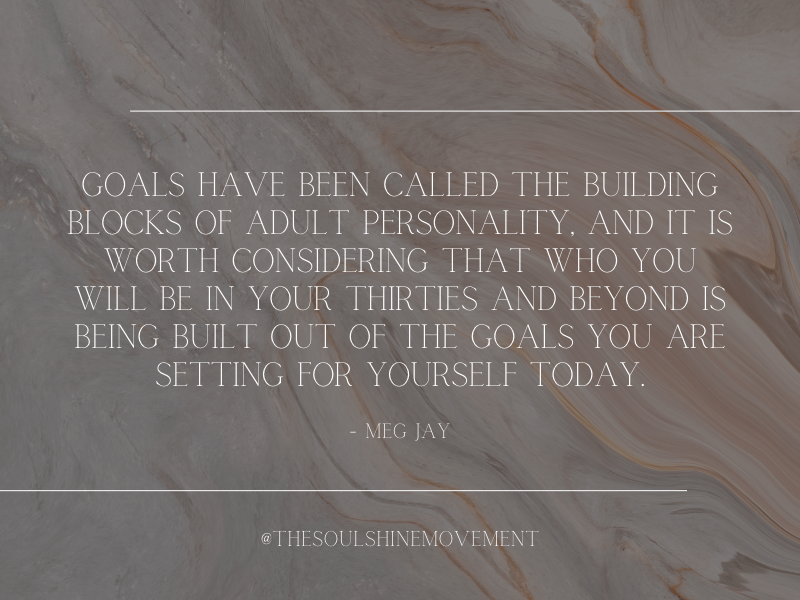
Related Reading: The Importance of Building Identity Capital
It is one of the most powerful ways for you to create the life of your dreams. Close your eyes for a minute and imagine what your dream life would look like: where do you live, who are the people in your life, what do you spend your time doing?
Do you want to travel the world? Do you want to quit your job and open a bakery? Whatever your dream life may look like, you aren’t going to get there by being a passive bystander.
Setting intentional goals is essential for creating the life you want. If you just expect to get by on luck or fate… well, good luck.
Goal-setting has also been shown to lead to greater well-being in life. When you set and achieve goals, you’ll have a greater sense of identity and find more motivation and purpose in life.
Goal Setting Meets Intentional Living: How to Set Intentional Goals
Being intentional about the goals you set is one of the biggest keys to creating a life that you find meaning in. If you’re setting goals for reasons outside of what you truly value in your life (such as to make other people happy or meet societal expectations), once you achieve them they most likely will not be a source of lasting happiness.
I can speak from experience on this one – I pursued some big goals for the wrong reasons. I spent a significant amount of time, money, and energy to earn my Master’s degree and CPA license. Was I passionate about accounting? No. I did it to secure a “stable job” and to make my parents proud.
With a few more years of life experience under my belt, I’ve learned that I do not enjoy accounting one bit and that my parents literally are just proud of the human that I am, not my accomplishments. Given the society that we live in, I’m guessing many of you can relate or have had a similar experience.
So, let’s dive into how to set intentional goals!
Step 1: Align Your Goals to Your Values
If you haven’t spent time identifying your values yet, do that first. In my opinion, identifying your values is the building block for living an intentional life. You can’t set intentional goals if you don’t know what you value.
Setting goals that align with your values will bring you closer to living a life centered around those values. It will help you become the type of person that you currently look up to and live a life that feels truest to you.
If you are currently working towards any goals, get clear on how they align with your values and re-evaluate whether they are truly goals that you want to continue pursuing.
Think about what you are passionate about, what you feel called to do, and what makes you feel most alive. What lights you up inside? What makes you so happy you lose track of all time?
Think about what you feel most connected to and what type of person you want to be. Think about how you want to show up in your life, for yourself and for others.
Discover what matters most to you, and then ask yourself how you can:
- Do more of it
- Get better at it
- Use it to make a positive impact on others
Identify goals that arise from these ideas: nothing is too big or too small.
Step 2: Prioritize Your Goals
Have you ever felt like your goals are just so far out of reach, or like you are working hard but aren’t making any significant progress? These types of feelings often lead to us believing that we just aren’t good enough. All too often, they result in us giving up on a goal completely.
This is frequently a result of one problem that can be easily solved: spreading ourselves too thin. The world is so full of opportunities, and many of us desire to do it all. There are endless opportunities to learn new things, travel to new places, and meet new people. It is easy to get caught up in all of the possibilities and try to do it all.
But in chasing down every experience to be had, we can actually miss out on the value that can only come as a result of investing our time and energy more deeply into what we care about the most.
“While investing deeply in one person, one place, one job, one activity might deny us the breadth of experience we’d like, pursuing a breadth of experience denies us the opportunity to experience the rewards of depth of experience.”
– Mark Manson, The Subtle Art of Not Giving a Fuck
Some of our more meaningful goals will require a lot of time and energy. Prioritizing your goals will allow you to focus your efforts on what is necessary to succeed.
Here are some tips for prioritizing your goals:
- Create a list of all of your goals
- Number each goal from 1 – 5 (use a 1-5 scale even if you have more than 5 goals – you aren’t ranking them against each other, rather determining how important the goal is to you, 1 being most important)
- Choose the goals you want to focus on first based on what you determined was most important to you (also consider anything that is time sensitive).
- Dive into the details of how much effort and time it will realistically take to achieve the goal, and evaluate how many goals you can realistically focus on at one time.
- Often it is best to focus on just one goal at a time, but if you have goals in different areas of life (ex. fitness vs. personal development), balance in your day to day is also important. We need variety in our days and you should never be sacrificing your health and wellness
- Remove any goals that don’t feel important to you or aligned with your values
- Keep an “on hold” list of the goals you can’t prioritize right now
If you try to prioritize everything, you are actually prioritizing nothing. You’ll have a much harder time actually making meaningful progress unless you are intentional and honest with yourself about what you have time for and where you want to focus your attention.
Don’t worry too much about setting timelines for your goals yet, unless something is time sensitive (we’ll get into timing in step 3).
Also remember that life is not a game of “now or never”. When you accomplish one goal, you can pick a new one from your “on hold” list to get started on. You might have even learned a thing or two from the processes you built for the first goal that will move you closer to achieving your other goals.
Step 3: Create a Plan of Action
Having a plan is everything when it comes to goal setting. It is the best way to set yourself up for success.
Breaking it Down
The first step here is to understand how you will get from A – Z. So ask yourself “what steps do I need to take to achieve this goal?” The more detailed, the better. When you break down a goal into smaller, actionable steps, it will seem much more manageable and attainable.
“Goals are about the results you want to achieve. Systems are about the processes that lead to those results.”
– James Clear, Atomic Habits
Setting up systems will help keep you on track and motivate you to keep going. When you break down your goals, you can enjoy the smaller wins and see that you’re making progress even when you haven’t reached the end goal.
Let’s say your goal is to be able to run a marathon, and you’re currently 50 pounds overweight and can only run two miles before you have to stop. Your breakdown of steps you need to take might look like this:
- Create a nutrition plan
- Cardio workouts 3x / week
- Strength workouts 2-3x / week
- Run for distance 2x / week
Once you have a better idea of what actions you’ll need to take to reach your goal(s), the next step is to get into timing.
Determining Timelines
I have mixed opinions on timelines and goals because I am personally terrible at estimating how long something will take. However – I do think that timelines help to hold you accountable for what you plan to accomplish and over time give you a better sense of your progress and where you are in the lifespan of completing a goal.

When it comes to timelines, determine what cadence of planning and reflection works best for you. Annual goals are super popular (going back to those New Year’s resolutions). I believe that a year is too long of a time frame and prefer to do goal setting on a quarterly basis, so let’s run with the assumption of quarterly goal setting.
This initial time frame should be how often you are setting goals, but does not necessarily mean that you will accomplish a goal within that time frame. If you set goals on a quarterly basis and are working towards a goal that you think will take a year, come up with a measure of progress you want to hit within that quarter.
Once you’ve set your goals for the quarter, start coming up with a more detailed plan. I think the best way to do this is to create a to-do list and set smaller goals at the beginning of each month and then get into action items on a weekly basis.
That might sound like A LOT of planning, but hear me out. This will allow you to figure out what you need to do on a day-to-day basis and makes it so much less intimidating to start taking meaningful action. It also allows you to modify your plan for what works and what doesn’t work.
Let’s revisit the marathon example:
Quarterly Goal:
- Create a nutrition plan and stick to it 6 days a week; be able to run 5 miles at an average pace of 10 minutes / mile
1st month plan:
- Create nutrition plan
- Be able to run 3 miles at an average pace of 11 minutes / mile
1st week plan:
- Meet with a nutrition coach and /or research nutrient dense food options
- 3 cardio workouts
- 2-3 strength workouts
- Run for distance 2x, record time and distance
The idea here is that you take it one month, one week, and one day at a time. Don’t try to plan out all three months of the quarter; that will most likely leave you feeling stressed or like a failure if at the end of month one you’re already behind and you feel like you need to play catch up.
If your plan is too vague, you’ll prioritize other areas of your life that seem more important in the moment. You’ll try to rationalize why you’ve put off working towards your goals, when in reality you just didn’t have a clear enough idea of what you needed to be doing.
Goal setting can be a time consuming process, but at the end of the day you’ll ultimately be saving yourself a lot of time because you’ll know what to focus on from the get-go.
How to Achieve Intentional Goals
Now that you’re a goal setting pro, let’s focus on how to achieve those goals.
Get in the Right Mindset
Mindset is everything when it comes to believing in yourself. Your mindset with anything in life can determine the course of your outcome.
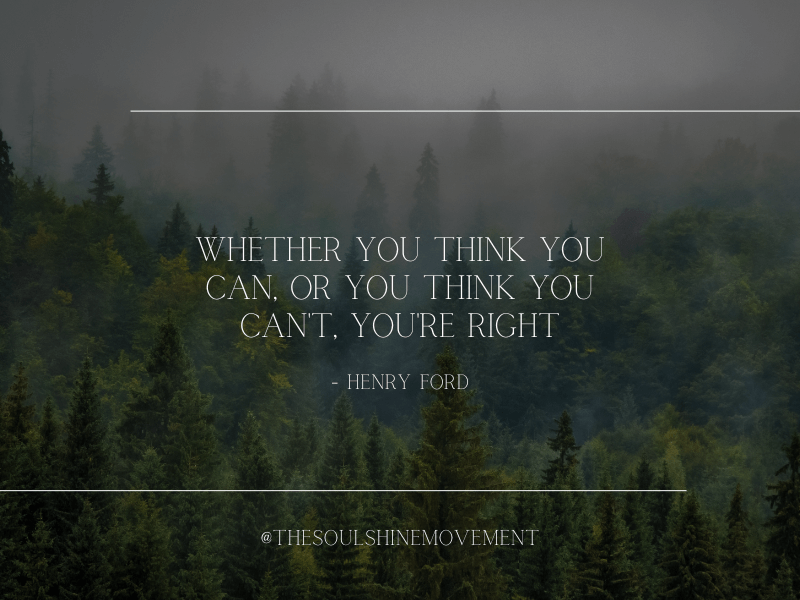
Learning to identify signs of a fixed mindset and working on developing a growth mindset will set you up for success.
Focus on the Process
While goals are useful for actually setting the direction of your actions, the process is what helps you to achieve your goals.
Setting goals is important for our personal growth, but it is beneficial to place more emphasis on the process for achieving that goal than the actual goal itself.
Why? Goals can restrict your happiness. If you have a goals-first mentality, you’ll never be satisfied or happy until you achieve that goal. And even then, once you do achieve it, the gratification will only last for a short while; soon enough, you’ll be wanting something more.
Focusing on the process also helps ensure that the goal is something you truly want to be working towards. If you don’t enjoy any part of the process or the smaller wins along the way, you might be chasing this goal for the wrong reasons.
Think about all the work it will take to get to the finish line on this goal – will it be worth it? Are you willing to put in the hard work to get there, or do you just want the end result? Do you want the lifestyle that comes with pursuing the goal? If the answer to any of these questions is no, you might want to rethink whether or not you want to go after the goal.
Be Consistent
It may be an overused phrase, but it is honestly underrated: consistency is key. Guys, it is. With everything in life. In most cases, what sets the extraordinary apart from the average is a willingness to continue putting in the work.
Find ways that work for you to stay consistent. Maybe that looks like using a planner on a daily basis or having an accountability partner.
When the process gets boring, tedious, or challenging and you want to quit, don’t! Don’t tell yourself you’ll come back to it next week; stick with your plan even during the difficult times. If you aren’t willing to put in the time, you’re simply not going to get the results. Show up for yourself every day, because at the end of the day, it’ll be worth it.
Create a Supportive Environment
Our environment has a stronger influence on our mood and productivity than you might expect. If you’ve worked from home during the pandemic, you’ve probably realized this to a certain extent.
For me, it’s hard to sit at my desk all day when my home is a mess. Having a clean, clutter free space allows me to focus on the task at hand.
This could look like a lot of things. If you get easily distracted by social media, turn off all notifications for those apps on your phone. If you’re trying to eat healthier, don’t allow yourself to buy junk food when you’re at the store. When you don’t have easy access or it’s not in plain sight, the temptation won’t be as strong.
Creating a supportive environment also looks like surrounding yourself with the right people. Find the people that challenge you to grow, support your decisions, and have your back no matter what. Let go of the people who don’t. And no matter what, don’t ever let someone else’s opinion of your personal life and the goals you are working towards be more important than your own.
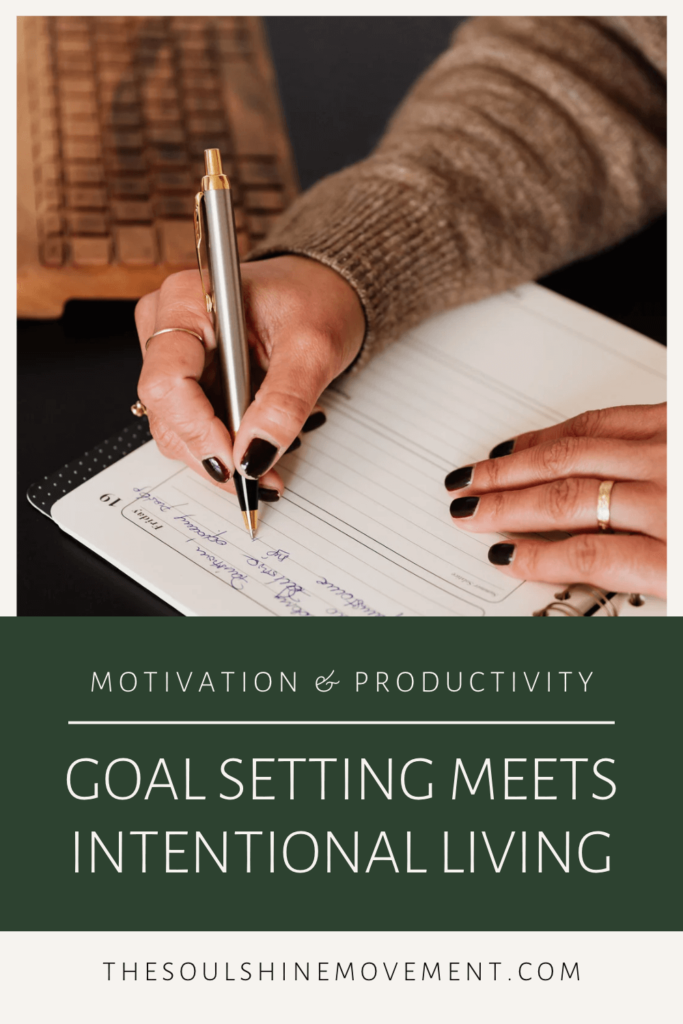
Measure Progress and Reflect
One of the many benefits of breaking down your goals into smaller steps is that it is easier to measure progress. If you set benchmarks for yourself, you can see where you’ve improved or made progress and how far you have left to go.
Being able to measure progress, reflect, and reset expectations is also a reason I like to do goal setting on a quarterly basis.
At the end of each week, reflect on what went well, what didn’t, and where you can make improvements. Give yourself a high five for the things that you accomplished, and recognize that you are one step closer to your goal.
With your observations from the previous week in mind, plan out your next week with realistic expectations. Do this each week, and then repeat the process at the end of each month as well.
When you get to the end of the quarter, do a deep dive into where you landed with your goals. Again, ask yourself what went well and where you can improve. If you accomplished a goal, allow yourself a moment to reflect and be proud of how far you’ve come.
If you fell short, be gentle on yourself. Maybe you didn’t give yourself enough time, maybe you ran into unexpected roadblocks, or maybe life just got too busy. Remember that these timelines are just guideposts, and they can be moved. Just because you didn’t accomplish something in the time that you expected does not mean that you can’t do it.
After you reflect on the previous quarter, get started on your goal setting for the next quarter. Reset expectations on the goals you are still working on, and if you feel like you have the capacity to add in a new goal, revisit your goals priority list.
Review your goals priority list each quarter – there may be things that have shifted in priority, goals you want to remove, or goals you want to add.
Most importantly, ruthlessly edit and remain honest with yourself. Things change over time, and a willingness and ability to adapt will allow you to move forward. Remember that this is your key to creating the life of your dreams, and don’t let anything stand in your way.
Need help coming up with ideas for new goals? Find some inspiration from these examples of personal growth goals.
Final Thoughts
Goal setting allows us to create meaningful lives by helping us determine a course of action. It helps us be more intentional in our day to day lives by guiding our focus to what matters most. Setting and achieving intentional goals provides us with a strong sense or purpose and identity.
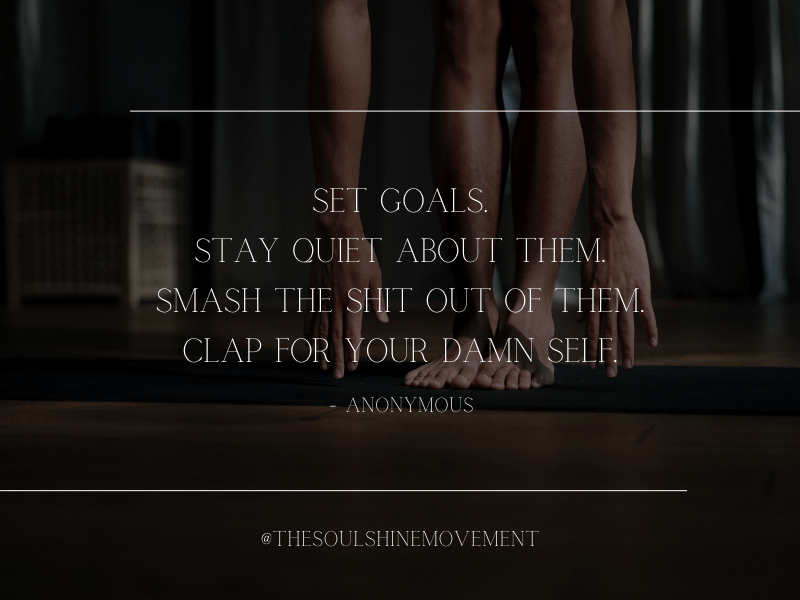
What goals are you actively working towards? How will this framework better help you achieve goals in the future?









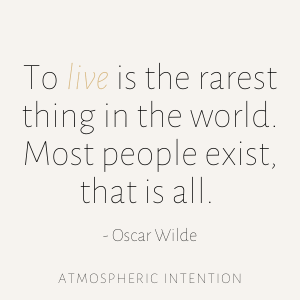

I have already gained a lot of things from reading this. I REALLY love the above quote (Anonymous)!
Thanks Clair!